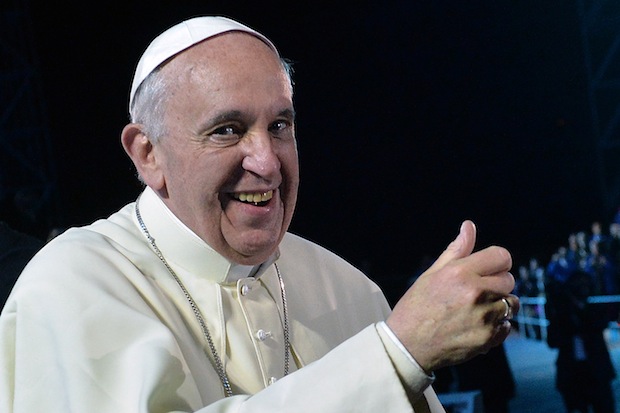Yesterday I took part in an interesting discussion at The Catholic Herald’s offices on the subject of Pope Francis’s first year. The question was, as it seemed to be for the BBC this morning, whether his ‘revolution’ has been one of substance or style. The answer, I reckon, is a bit of both – and a bit of neither. Yes, Francis has thrilled left-liberals everywhere by suggesting that the Church should be nicer to gays and women, by telephoning famous atheists for a chinwag, and by – altogether now – ‘snubbing the pomp and ceremony’ of the papal office.
But I’m not sure how radical a departure all that is, really. To listen to some commentators, you’d think that Popes John Paul II and Pope Benedict XVI had trotted about the world saying, ‘Well these poor folk are just getting what they deserve, lazy sods, and the sick deserve to suffer because they are probably gay. Now pass me my tiara, Alfredo.’ When obviously they, er, didn’t.
Francis comes across as what he is – a holy man who loves the poor, the sick and the wretched. But the notion that his concern for the unfortunate marks some sort of volte-face in Catholic history is stupid. It’s true that his language and attitude have been different. He is the first Pope to have used the word ‘gay’ to mean homosexual, in public at least, which is not uninteresting. His approach to leadership is more immediately evangelical than that of his predecessor Pope Benedict. But it’s worth remembering that almost every Pontiff in the last century has been praised in his first months for his private austerity and holiness — and for being a breath of fresh air. It’s just what people say about new Popes. The press said much the same of John XXIII Paul VI, John Pauls I and II, and even the conservative ‘Rottweiler’ Benedict.
Still, the widespread perception of Francis’s revolution of style does mean that he is now well-placed to carry out a revolution of substance, a radical reform of the Curia. This is something lots of Catholics — liberal and conservative – have long prayed for. Francis has already begun the tackling corruption at the Vatican bank, a longstanding source of embarrassment, and he has put Cardinal Pell – a no-nonsense conservative type — in charge of a new Vatican finance department. Arguably, he has moved to decentralize the Church – pushing authority away from Rome. He has asked his Cardinals to think more in a more ‘collegial’ way. This is a possible shift that excites Catholic liberals and alarms conservatives, since the Vatican has come to be seen as a bastion of tradition and the more collegiate parts of the Church’s hierarchy, such as the various bishops conferences, as the agents of progress. But it ain’t that simple. A less centralised Church does not necessarily mean a more liberal one. Individual parishes are often far more conservative than their bien-pensant bishops would like. It will be interesting to see whether Pope Francis does indeed intend to hand over more power to the bishops’ conferences, or whether – as his questionnaire to the laity suggests – he wants to do something far more radical.
Curial reform and collegiality sound pretty boring to non-Catholics, however, and I predict that many of the secular pundits who now laud Pope Francis will go off him pretty quickly when they realize that he wants to embrace the spirit of Vatican II more than he wants to liberalise Church teaching on condoms, feminism and all gay rights. (One of funnier aspects of media coverage of Catholicism is that commentators who spend a lot of energy denouncing the Church as sex-obsessed have no interest in Catholic stories which are not about sex.)
Meanwhile, Francis’s more loyal admirers within the progressive Catholic flock will insist that his good intentions are being thwarted by the creepy traddies in Rome – and the press will gleefully quote them saying so. But as this media dance plays out, the real Pope Francis may just have time to finish the substantial reform he has started.







Comments